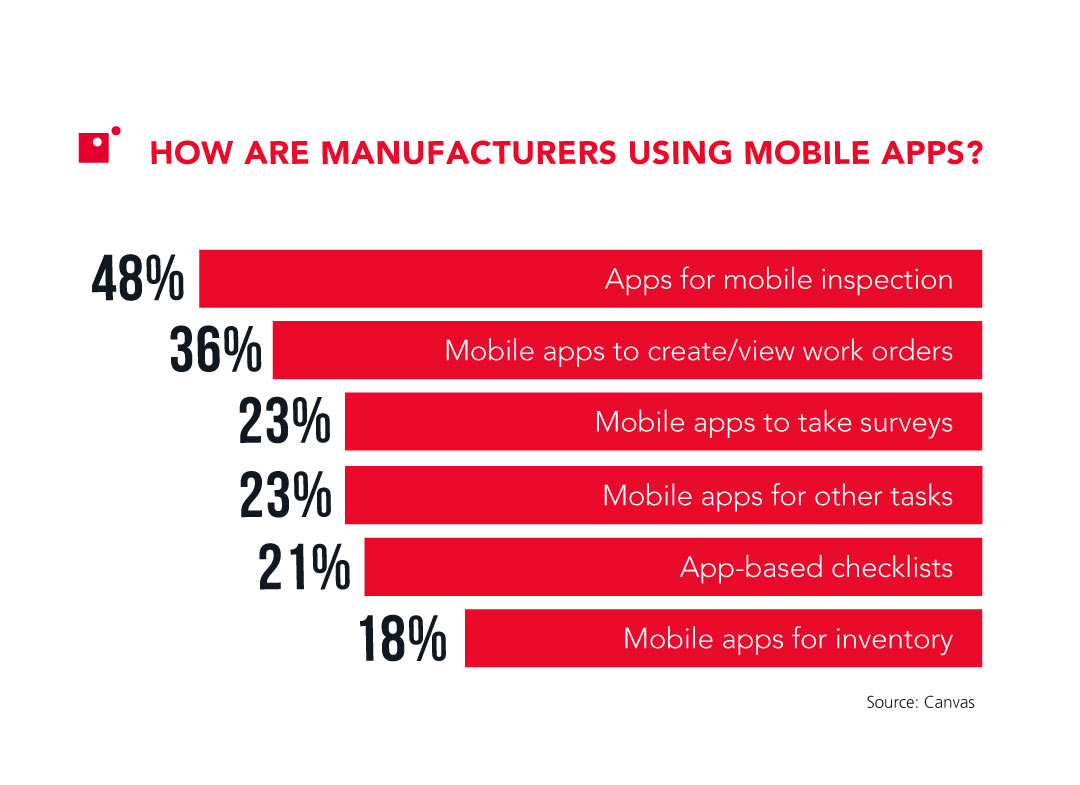Mobile app development in manufacturing has become a lot easier since the widespread use and adoption of new technologies and tools.
The foremost example of these tools is the low-code platform, a rapid app development tool which allows organizations to create custom applications for a fraction of the time and cost of traditional software development.
For manufacturers, this provides a unique opportunity. While enterprise manufacturers might make headlines with showcases in new tech advancements, manufacturing organizations as a whole aren’t typically known for being frontrunners in technology.
Related Post: Why Is Digital Transformation in Manufacturing Falling Behind?
So, how exactly can mobile app development in manufacturing benefit SMB organizations today? And how can they get a strategy in place for developing custom software applications right now?
That’s what we’ll be taking a look at today.
The State of Technology in Manufacturing
When we talk about manufacturing lagging behind when it comes to technology, it’s often the case that businesses in the industry, while technologically astute in some areas, come up short in several others.
For example, they might have designated high-tech machinery which produces a specific product, but be lacking in the necessary cloud infrastructure and systems integration needed to perform data analysis to improve product development.
The fact remains that by and large, organizations in manufacturing often fall quite short of their peers in other industries.
With the advent of the Fourth Industrial Revolution, or Industry 4.0, this doesn’t give businesses a lot of wiggle room regarding their preparedness for what’s to come.
Overall, just 20.7% of manufacturing organizations rated themselves as “highly prepared” to address the emerging business models the Fourth Industrial Revolution brings. However, 81% of manufacturers say they are ready to invest in new digital technologies to boost productivity.
Legacy Systems in Manufacturing, Bridging the Gap
One of the primary issues is that many companies in manufacturing still today rely on outdated legacy systems to run their operations.
These are systems that are often integrated into the organization, but lack many of the features that have come to be expected of modern applications.
Related Post: Legacy Systems in Digital Transformation: Risks and Challenges
Issues with these systems will often include:
- Maintenance issues
- Incompatibility with modern digital solutions such as cloud and SaaS software
- Weak security, lack of updates and patches
- Inflexibility that impacts the customer and employee experience
The good news is that many of these problems can be overcome by investing in a technology plan and implementing modern solutions.
The bad news is that manufacturing is a far more specialized industry than most, and many issues are completely unique to a business, often coming down to a single process that needs addressing.
And this is where mobile applications come in to bridge the gap. Where before it would have simply not been feasible for a business to create an app that can solve a specific business process; tech like low-code has opened up a number of new possibilities for businesses—particularly small and midsize organizations.
Manufacturing and Low-Code Technology
Low-code is being used by manufacturers with increasing levels of adoption today, owing to its uses varied uses—particularly in industrial manufacturing environments.
Here are some examples of how low-code can be used in manufacturing:
Energy efficiency
One of the use cases for low-code in manufacturing regards organizations using custom-made apps for the purposes of monitoring.
This is often pursued by companies that are conscious of their energy consumption, and use these apps for the following:
- Energy utilization monitoring
- Energy consumption monitoring
- Asset, line, and plant-level analysis
- Meter inspection and data collection
Quality management
Manufacturers are using low-code QMS platforms for their quality management programs. Because of the flexibility of low-code platforms, incorporating tasks that are necessary to remain in compliance with changing regulations a far simpler than traditional app development.
In addition, these QMS low-code applications can be integrated into the organization’s enterprise content management (ECM) system, meaning workflows can be tracked and documents can be easily found for the purposes of external audits or internal inspections.
Equipment inspection
Ensuring that machines and equipment are inspected and maintained is crucial in avoiding costly expenses due to repairs.
This has become an issue of such importance for organizations today that manufacturers are investing heavily in predictive analytics in order to avoid what have historically been a big issue for companies to contend with.
According to Deloitte, IIoT-based predictive maintenance solutions are expected to reduce factory equipment maintenance costs by 40% and generate an economic value of $630 billion annually by 2025.
Automation
Automation is a crucial element of the modern supply chain, and manufacturers are using low-code technology to automate and improve the efficiency of their workflows in order to improve overall productivity.
The rise of Internet of Things (IoT) tech that is now pervasive in manufacturing environments, including sensors, smart devices, and other Internet-connected peripheries, means there are many more streams of data in these workplaces today.
In order to effectively leverage this data, low-code is used to automate workflows and channel data to a central repository (typically an enterprise resource planning (ERP) system), from which they can then perform data analysis and receive actionable insights.
72% of low-code developers create apps in three months or less, compared with six months or even years to develop applications using traditional development.
Low-code platforms allow for stakeholders to build visual workflows that ensure the data they need is delivered to the right person at the right time, with little room for the pitfalls (data entry issues and labor efficiency) that arise from requiring employees to perform these workflows manually.
Mobile Applications in Manufacturing
Internet of Things apps
The Internet of Things has become a prevalent feature of modern organizations, owing largely to the improvements that can be found from increased interconnectivity.
This is no less the case than in manufacturing, where businesses have been developing mobile apps to track the health of their machines through sensors.
The premise is quite simple: sensors are installed on machines and feed information to mobile devices through the cloud.
When there appears to be problem mounting, rules can be programmed into the app so that pre-defined sensor readings automatically send alerts to personnel.
This method of operation using mobile apps to determine the status of machines drastically reduces the costs of maintenance—discovering problems before they arise instead of getting a bad surprise when a breakdown occurs.
Logistics apps
Tracking and supply chain management have become major hurdles to manufacturing businesses streamlining their operations.
Mobile app development can be used to create much more comprehensive operation when it comes to the supply chain—providing location-based information for assets and relaying the information and data in real-time to employees.
If there is an issue in the chain, you can be notified immediately and make accommodations to keep it running as smoothly as possible.
This extends to everything at every stage of the supply chain—inventory, worker, shipment, delivery, and vehicle data.
Quality control apps
Manufacturers don’t need to be reminded about the strict compliance regulations they have to abide by.
They also don’t have to be reminded about how the amount of paperwork that’s involved with having to perform quality control tasks.
One of key aspects of digital transformation within a business is reducing reliance on paper-based processes in favor of digital processes that are more efficient.
This is no less the case in quality control, where you can expect to see clipboards up and down a production line, but a mobile app can provide numerous benefits—inspect assembly data in real-time; automatically email reports to stakeholders and store them on a secure cloud server instantly.
Why Not Just Modernize Every Legacy System?
As we mentioned earlier, legacy systems can carry with them a fair amount of dead weight—they can be clunky, unintuitive, and inefficient when compared to modern cloud systems.
However, it should be acknowledged that not every organization should update their systems just for the sake of it. Many will rightly note that tearing out and replacing your systems can be a big gamble, and failure is not uncommon if the strategy isn’t planned out as well as it should be.
And so mobile app development for a manufacturing business can provide an app to those with modern systems who have a unique need; or those with legacy systems who aren’t on board with wholesale change, but similarly need a solution for their business.
Takeaways
- Manufacturing organizations are often found to be lacking in their digital technology implementation, still relying heavily on inefficient paper-based processes.
- Mobile app development is useful for addressing common issues relating to information management and data gathering.
- Custom apps are useful to businesses that need to bridge a gap between their legacy system and the capabilities of mobile technology they want to utilize.
At Impact Networking, our highly qualified developers create complex, innovative apps for organizations at a fraction of the cost and time thanks to advances in low-code development. To learn more, check out our custom app development services.


